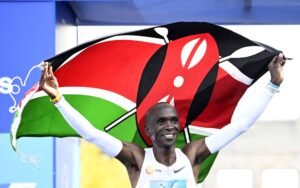Reading Time: 3 minutes
Marathons have a rich history and are a fascinating subject for both runners and non-runners alike. Here are some facts about marathons:
1. Origins of the Marathon
- The marathon distance is based on the legend of Pheidippides, a Greek messenger who ran from the battlefield of Marathon to Athens to announce a Greek victory over the Persians in 490 B.C. The distance he covered was approximately 26 miles.
2. Official Marathon Distance
- The standard marathon distance of 26.2 miles (42.195 kilometers) was established during the 1908 London Olympics. The race was extended so that it could start at Windsor Castle and finish in front of the royal family’s viewing box at the Olympic Stadium.

3. Oldest Annual Marathon
- The Boston Marathon, first held in 1897, is the world’s oldest annual marathon. It attracts runners from all over the globe and is known for its challenging course and enthusiastic spectators.
4. Marathon Popularity
- There are over 800 marathons held worldwide each year, with millions of participants. Marathons have grown in popularity, and cities like New York, Chicago, and Berlin host some of the largest events.
5. Record Holders
- The current men’s world record for the marathon is held by Eliud Kipchoge of Kenya, who ran a time of 2:01:39 at the 2018 Berlin Marathon.
- The women’s world record is held by Brigid Kosgei, also from Kenya, with a time of 2:14:04 set at the 2019 Chicago Marathon.

Kipchoge
6. Notable Marathon Achievements
- In 2019, Eliud Kipchoge ran a marathon in under 2 hours (1:59:40) in a special event in Vienna, Austria. Although this time is not an official world record due to the controlled conditions, it was a monumental achievement in the running world.
- Kathrine Switzer was the first woman to officially run the Boston Marathon in 1967, despite attempts to remove her from the race because of her gender.
7. Ultra Marathons
- Ultra marathons are races longer than the traditional marathon distance of 26.2 miles (42.195 KM). Common ultra distances include 50 kilometers, 50 miles, and 100 miles. These races often test the limits of human endurance.

8. Marathon Majors
- The Abbott World Marathon Majors is a series consisting of six of the largest and most renowned marathons: Boston, New York City, Chicago, Berlin, London, and Tokyo. Completing all six is a prestigious achievement for marathon runners.
9. Marathon Training
- Training for a marathon typically takes 16-20 weeks, with runners gradually increasing their mileage to prepare for the race. Long runs, speed work, and rest days are crucial components of a training plan.
10. Health Benefits
- Training for and running a marathon can significantly improve cardiovascular health, increase muscle strength, and enhance mental well-being. However, it’s important to train properly to avoid injuries.
11. Marathon Medals
- Finishers of marathons often receive medals as a reward for their achievement. Unlike many other sports where only the winners are awarded, in marathons, every participant who completes the race receives a medal, celebrating their accomplishment.
12. Charity and Community
- Many marathons have a strong charity component, with runners raising millions of dollars for various causes. This aspect of marathoning brings communities together and supports important work around the world.
13. Oldest Marathon Runner
- Fauja Singh, known as the “Turbaned Tornado,” ran his last marathon at the age of 101, becoming an inspiration for older athletes.
14. First Women’s Marathon in the Olympics
- The first women’s marathon in the Olympics was held in 1984 in Los Angeles. Joan Benoit of the USA won the gold medal.
Conclusion
Marathons are not just races; they are events steeped in history, challenge, and personal achievement. Whether you’re a seasoned runner or a spectator, understanding these facts can deepen your appreciation for the marathon and the incredible feats accomplished by those who participate.
